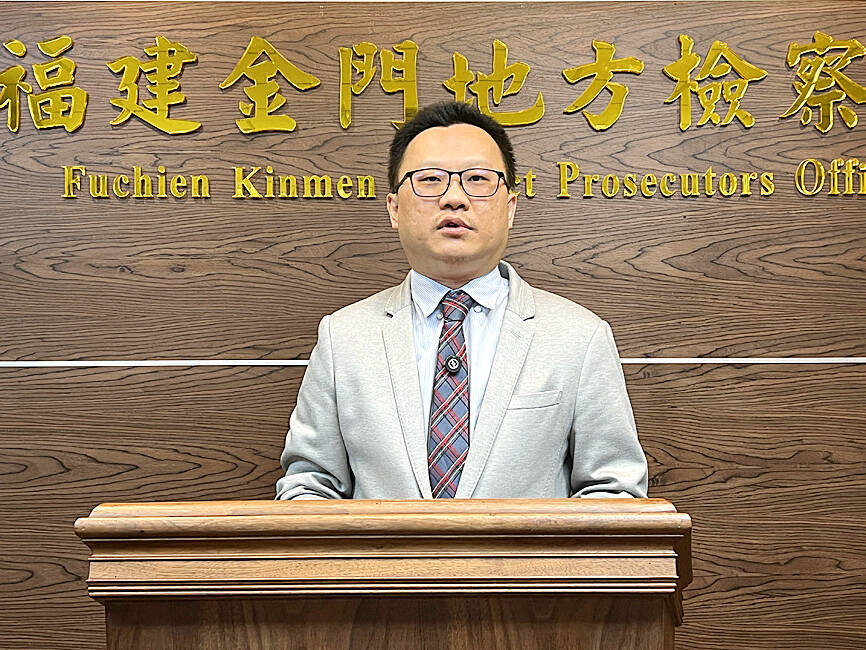Kinmen prosecutors have decided not to indict two Coast Guard Administration (CGA) officers connected with the deaths of two Chinese nationals in a capsizing incident in February due to insufficient evidence.
The unnamed and unregistered Chinese boat, which had four people on board, was spotted by a CGA patrol vessel on Feb. 14 in Taiwan-controlled restricted waters off Kinmen.
The Chinese boat fled after refusing a coast guard patrol vessel’s request to board it, resulting in a high-speed chase which ended when the vessel made a sudden turn, collided with the CGA patrol vessel and capsized, leading to the deaths of two Chinese crew members.

Photo: Wu Cheng-ting, Taipei Times
Following the incident, two of the four Taiwanese on the patrol vessel — the captain, surnamed Huang (黃), and the helmsman, surnamed Tsai (蔡) — were investigated for alleged negligent homicide.
The Kinmen District Prosecutors’ Office said in a statement on Friday that it had decided not to indict Huang and Tsai on any charge.
The other two personnel on the patrol boat were not under investigation, because prosecutors felt the two had no say in the movements of the vessel.
Defending its decision, the office said the pursuit occurred within Taiwanese waters, where the Chinese boat had no right to be without permission, and that the CGA officers acted in accordance with established rules.
The collision did not exceed legal risk limits, as a forensic analysis found that the damage on the port side of the Chinese boat was caused by friction and compression, and did not indicate deliberate damage, the office said.
The finding was also supported by the accounts of the surviving Chinese fishers, who in February after the incident occurred said their boat was an unlicensed “black boat.”
The survivors said they did not believe the boat capsized due to the collision, adding that the deceased Chinese helmsman, surnamed Yu (于), did not have a license before acquiring the boat in January and had operated it less than 10 times.
In addition, experts said in a report on the incident issued earlier this year that the boat had not passed a seaworthiness inspection or been registered, making it an unsafe vessel prone to water ingress and instability when tilted.
Although Kinmen prosecutors felt there was no evidence to support an indictment of Huang and Tsai for the collision, that decision did not mean that the coast guard’s performance was flawless.
On July 30, CGA Director-General Chang Chung-lung (張忠龍) apologized for the four coast guard personnel not carrying cameras during their mission.
Ocean Affairs Council (OAC) Minister Kuan Bi-ling (管碧玲) on Friday said the CGA, which is an OAC agency, would equip each of its staff members with a camera starting from Thursday next week.
The CGA has begun installing surveillance systems on the hulls of its boats, which is expected to be completed by the end of December, she added.
The lack of cameras made it difficult to get an accurate picture of what happened and what sparked the collision.
As for the deceased, the CGA has reached an agreement with their families and would implement it soon, CGA Deputy Director-General Hsieh Ching-Chin (謝慶欽) said on July 30.
It has not disclosed the details “out of respect for the families involved and the consensus reached in the cross-strait agreement.”

A strong continental cold air mass is to bring pollutants to Taiwan from tomorrow, the Ministry of Environment said today, as it issued an “orange” air quality alert for most of the country. All of Taiwan except for Hualien and Taitung counties is to be under an “orange” air quality alert tomorrow, indicating air quality that is unhealthy for sensitive groups. In China, areas from Shandong to Shanghai have been enveloped in haze since Saturday, the ministry said in a news release. Yesterday, hourly concentrations of PM2.5 in these areas ranged from 65 to 160 micrograms per cubic meter (mg/m³), and pollutants were

Taiwan’s armed forces have established response protocols for a wide range of sudden contingencies, including the “Wan Chun Plan” to protect the head of state, the Ministry of Defense (MND) said today. After US President Donald Trump on Saturday launched a series of airstrikes in Venezuela and kidnapped Venezuelan President Nicolas Maduro, concerns have been raised as to whether China would launch a similar “decapitation strike” on Taiwan. The armed forces regularly coordinate with relevant agencies and practice drills to ensure preparedness for a wide range of scenarios, Vice Minister of National Defense Hsu Szu-chien (徐斯儉) told reporters before a

EVA Airways on Saturday said that it had suspended a pilot and opened an investigation after he allegedly lost his temper and punched the first officer several times as their plane was taxiing before takeoff at Los Angeles International Airport. According to a report published on Thursday by The Reporter, the incident occurred after the flight’s Malaysian first officer tried to warn the Taiwanese pilot, surnamed Wen (文), that he was taxiing faster than the speed limit of 30 knots (55.6kph). After alerting the pilot several times without response, the first officer manually applied the brakes in accordance with standard operating

Japanese Councilor Hei Seki (石平) on Wednesday said that he plans to visit Taiwan, saying that would “prove that Taiwan is an independent country and does not belong to China.” Seki, a member of the Japan Innovation Party, was born in Chengdu in China’s Sichuan Province and became a naturalized Japanese in 2007. He was elected to the House of Concilors last year. His views on the Chinese Communist Party (CCP) — espoused in a series of books on politics and history — prompted Beijing to sanction him, including barring Seki from traveling to China. Seki wrote on X that he intends